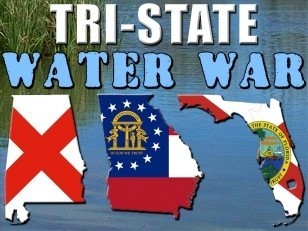Allen Barnes previously led Georgia's Environmental Protection Division. Now he is president and CEO of Joe Tanner and Associates, and the lobbying firm is paid $5,000 a month for Barnes' work as a negotiator in a long-running water conflict with neighboring Alabama and Florida.
Until last week, Barnes' lobbying firm was going to be hired in a government-backed project testing whether underground water can be pumped into depleted rivers and streams, which supporters say would get more water to Alabama and Florida and possibly ease their conflicts with Georgia. The regional agency sponsoring the project pulled out of the deal last week, meaning it no longer needs services from Barnes' firm. Barnes said his lobbying firm has no immediate plans to work with another applicant, though he remains interested in the technology.
The governor's chief of staff, Chris Riley, said the test project was in the best interests of the state and he called Barnes "one of the most ethical men" he knows. But when asked, Riley said there could be a perceived clash between Barnes' public duties and his business interests.
"Yes, there could be a conflict," Riley said. "But yes, it's also extremely helpful."
A small group of officials has access to information about the closed-door negotiations between the three states. Those officials are bound by a court order not to publicly discuss their work. In addition, Barnes signed a legal agreement promising not to disclose without permission any proprietary information gained from his work as a negotiator, according to documents reviewed under the state's open records law.
Lawyers and government watchdog groups say the arrangement is legal, and Barnes said in an interview that his roles do not conflict. He said any advantage enjoyed by his firm is because of its hard work and expertise, not his work in the tri-state negotiations. Barnes said it was wrong to think that any single water supply project would solve the decades-old dispute between the states.
"If there was a silver bullet out there, then you would think someone would have found it over a 20-year period," Barnes said.
A government watchdog group said the arrangement at a minimum was awkward.
"For the average person, this is the type of thing that doesn't smell right," said William Perry, executive director of Common Cause Georgia.
As the state's chief environmental regulator, Barnes was a top adviser to then-Gov. Sonny Perdue and current Gov. Nathan Deal during water negotiations. When he left office in late 2011, Deal's administration decided to pay Barnes as a consultant so he could remain on Georgia's negotiating team.
Before Barnes arrived at the lobbying firm, its members were interested in testing whether water can be stored in underground aquifers, then pumped to the surface to supplement drought-parched waterways when needed, a concept called aquifer storage and recovery. Deal's administration awarded the Southwest Georgia Regional Commission, a public agency, roughly $5 million in funding for a project testing the concept.
Now that state officials are leading the project, they are seeking new proposals from firms interested in building and designing the system.
The pumping technology could have several uses. The current director of the Environmental Protection Division, Judson Turner, said he wants to see whether it could be used to add extra water to streams so wildlife does not die during droughts in the Flint River basin. A die-off could prompt court rulings that restrict water supply for the region's farmers, businesses and residents.
Developers say there is a second - and more lucrative use - connected to the multi-state dispute over water use in the Chattahoochee, Flint and Apalachicola rivers, which serve Alabama, Florida and Georgia. Project supporters proposed building a network of pumps costing at least $1 billion that could boost the amount of water flowing along the border of Alabama and into Florida. If Georgia could guarantee its neighbors get more water, project backers say metro Atlanta could seek more water from Lake Lanier, historically a flashpoint in the tri-state dispute.
"In this regard, it is believed that stream flow augmentation will play some role in the resolution of the Apalachicola-Chattahoochee-Flint Basin dispute between Georgia and Florida," the application said.
Deal's administration said the technology can be considered for larger use only if the test works.
Barnes said he was not directly involved in the project application. But he did review a scope-of-work document for the deal and acknowledged that he likely had less-formal discussions about it with others in the small lobbying firm.
The commission's application highlighted Barnes' governmental work while explaining why Barnes' lobbying firm was uniquely qualified to secure project permits. It noted that several ex-government officials who have participated in the tri-state water talks work at Joe Tanner and Associates. Of them, only Barnes is involved in those talks now.
"Allen Barnes (JTA) has been one of Governor Perdue's and Governor Deal's chief negotiators with Florida and Alabama for the last three years," the application said. "This means that they have insight into expectations of these states from Georgia."
Constructing a massive network of pumps would have probably been viewed more favorably in Georgia before an appellate court ruling in mid-2011 averted an immediate water crisis for metro Atlanta. That ruling struck down a lower court's order that would have significantly reduced metro Atlanta's water withdrawals from the federal reservoir at Lake Lanier.
But the larger conflict remains unresolved. This month, U.S. senators from Alabama and Florida tried to legislatively restrict Atlanta's use of the lake.

http://accesswdun.com/article/2013/5/261662
